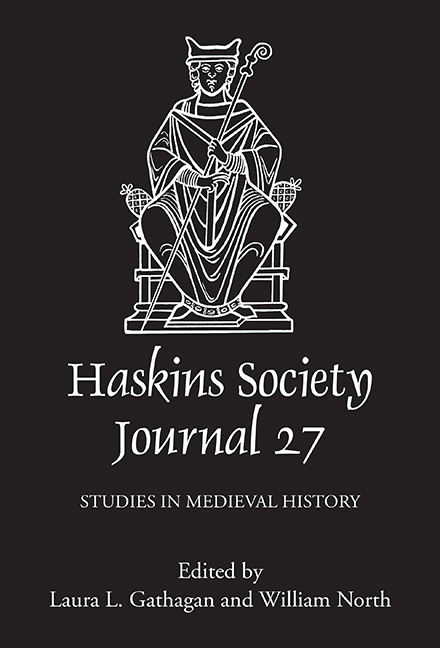Book contents
- Frontmatter
- Contents
- List of Figures
- Editors’ Note
- Abbreviations
- 1 Rural Settlement in Roman Britain and Its Significance for the Early Medieval Period
- 2 Holy Relics, Authority, and Legitimacy in Ottonian Germany and Anglo-Saxon England
- 3 Beyond the Obvious: Ælfric and the Authority of Bede
- 4 Byrhtferth’s Historia Regum and the Transformation of the Alfredian Past
- 5 Geoffrey le Bel of Anjou and Political Inheritance in the Anglo-Norman Realm
- 6 Observations on the Twelfth-century Historia of Alfred of Beverley
- 7 Helena, Constantine, and the Angevin Desire for Jerusalem
- 8 The Revolts of the Embriaco and the Fall of the County of Tripoli
- 9 Jewish Women, Christian Women, and Credit in Thirteenth-Century Catalonia
- 10 Military Entrepreneurs in the Armies of Edward I (1272–1307) of England
2 - Holy Relics, Authority, and Legitimacy in Ottonian Germany and Anglo-Saxon England
Published online by Cambridge University Press: 07 May 2022
- Frontmatter
- Contents
- List of Figures
- Editors’ Note
- Abbreviations
- 1 Rural Settlement in Roman Britain and Its Significance for the Early Medieval Period
- 2 Holy Relics, Authority, and Legitimacy in Ottonian Germany and Anglo-Saxon England
- 3 Beyond the Obvious: Ælfric and the Authority of Bede
- 4 Byrhtferth’s Historia Regum and the Transformation of the Alfredian Past
- 5 Geoffrey le Bel of Anjou and Political Inheritance in the Anglo-Norman Realm
- 6 Observations on the Twelfth-century Historia of Alfred of Beverley
- 7 Helena, Constantine, and the Angevin Desire for Jerusalem
- 8 The Revolts of the Embriaco and the Fall of the County of Tripoli
- 9 Jewish Women, Christian Women, and Credit in Thirteenth-Century Catalonia
- 10 Military Entrepreneurs in the Armies of Edward I (1272–1307) of England
Summary
Holy relics played an important role in the political activities of both the Anglo-Saxon kings in England and the Ottonian kings and emperors in tenth-century Germany. Kings in both realms were active in the translation and acquisition of relics as both pious and symbolic political acts. Relics were used as currency in diplomatic and formal gift-giving exchanges and were carried into battle for aid and protection. Rulers staged elaborate public ceremonies to solemnize translations of relics. Relics also provided opportunities for legitimation by foreign or contested kings in tenth-century Germany and England. This paper explores the idea that while the Ottonians and Anglo-Saxons both co-opted the symbolism of relics for the purpose of establishing legitimacy, the Ottonians used relics to establish an ideology – even a mythology – about their rule, as well as to reinforce the legitimacy of their claims to both the royal and imperial titles, in much the same way that they used ruler images to reflect their evolving ideology about kingship.
This study will focus on the Holy Lance as one object of this program, looking at the tenth-century narrative sources that emphasize the role of the lance in establishing empire and authority for the Ottonian dynasty: Liudprand of Cremona's Antapodosis, written between 958 and 962; Widukind of Corvey's Rerum gestarum Saxonicarum libri tres, probably completed c. 967/968, with additional chapters added after Otto I's death in 973; and Thietmar of Merseburg's Chronicon, written between 1012 and 1018.
These three chroniclers, important contemporary sources for Ottonian history, approached their narratives from distinctly different points of view. Liudprand of Cremona (c. 920–972) served at the court of Otto I after he fled Italy when he fell out of favor at the Italian court of Berengar II. He wrote his Antapodosis, meaning ‘revenge’ or ‘retribution’, to highlight examples of divine retribution in recent history as well as to serve as a personal revenge against those he felt had wronged him. His portrayals of the Ottonians are generally positive. We know significantly less about Widukind of Corvey (c. 920–925?–after 973). A monk at the monastery of Corvey, his name and the focus on Saxony in his history suggests that he himself was a Saxon.
- Type
- Chapter
- Information
- The Haskins Society Journal 272015. Studies in Medieval History, pp. 15 - 38Publisher: Boydell & BrewerPrint publication year: 2016
- 1
- Cited by



